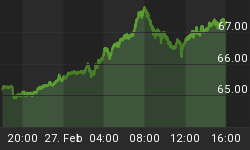I happen to like 10-year US treasuries here, and have since rates got near 3%. I believe job growth is way overstated due to double-counting of part-time jobs, the global economy is slowing more than economists expect, and the US economy is slowing more than economists expect.
Betting Against Treasuries a Fool's Game?
Jeffrey Gundlach CEO of DoubleLine Capital goes even further. Gundlatch claims Betting Against Treasuries a Fool's Game.
The market was "entering 2014 struck by a greater consensus entering any year that I can remember, that the dollar has to do well, gold is for losers and bond yields will rise," said Jeffrey Gundlach, chief executive officer of DoubleLine Capital, which manages $49 billion. "Things were so lopsided in terms of that positioning. That was late in that way of thinking."
The amount of bets against 10-year Treasuries by hedge funds and other large speculators shrunk to as low as 58,000 contracts last month from a 19-month high of about 189,000 in November, data from the Commodities Futures Trading Association show.
Mr. Gundlach predicts yields will fall in 2014, with demand rising from investors such as banks seeking high-quality collateral to meet new regulatory requirements and as a haven for others from political and economic turbulence in nations ranging from Turkey to Argentina.
Gundlach (Bull) vs. Rosenberg (Bear)
One long-time bond bull recently turned bearish, and he sees no reason to change course. Yields will reverse and end the year at 3.5% to 3.75% as the economy improves, according to David Rosenberg, the chief economist at Gluskin Sheff & Associates.
"The economy is on a moderate accelerating trend," Mr. Rosenberg said. "We're coming out of a flight to quality on emerging markets. This is a blip rather than a long-term trend. The yield decline is temporary."
Will the US Economy Accelerate?
David Rosenberg thinks the economy is going to accelerate. If the economy does accelerate, the Fed will increase tapering, not reduce it.
Looking for another opinion?
Marc Faber Bullish on Treasuries and Gold
Taken from a Barron's roundtable discussion, ZeroHedge reports Marc Faber Warns "Insiders Are Selling Like Crazy... Short US Stocks, Buy Treasuries Gold".
Faber: What I recommend to clients and what I do with my own portfolio aren't always the same. That said, my first recommendation is to short the Russell 2000. You can use the iShares Russell 2000 exchange-traded fund [IWM]. Small stocks have outperformed large stocks significantly in the past few years.
Next, I would buy 10-year Treasury notes, because I don't believe in this magnificent U.S. economic recovery. The U.S. is going to turn down, and bond yields are going to fall. Abby just gave me a good idea. She is long the iShares MSCI Mexico Capped ETF, so I will go short.
Q: What are you doing with your own money?
Faber: I have a lot of cash, and I bought Treasury bonds. ... I have no faith in paper money, period. Insider buying is also high in gold shares. Gold has massively underperformed relative to the S&P 500 and the Russell 2000. Maybe the price will go down some from here, but individual investors and my fellow panelists and Barron's editors ought to own some gold. About 20% of my net worth is in gold. I don't even value it in my portfolio. What goes down, I don't value.
Curious Position
US treasuries are a curious position for someone frequently in the hyperinflation camp, which brings up this humorous conversation from Barron's.
Faber: I recommend the Market Vectors Junior Gold Miners ETF [GDXJ], although I don't own it. I own physical gold because the old system will implode. Those who own paper assets are doomed.
Zulauf: Can you put the time frame on the implosion? Faber: Let's enjoy dinner tonight. Maybe it will happen tomorrow.
Price Inflation on Hold
If the economy implodes (or even modestly declines) US Treasuries will benefit. Even a frequent hyperinflationist and firm disbeliever in paper assets gets it!
Here's my claim: Deflation Will Return: Europe First, Then US
Strong consumer price inflation, is on hold for a long time. US hyperinflation in this environment is next to impossible.















